Having taken the nation by storm, Foosballers has won a slew of prestigious film festival awards, including the Golden Whistle for best film at last summer’s Kicking + Screening Soccer Film Festival. We got a chance to sit down with the documentary’s director Joe Heslinga, discussing the compelling stories of pro foosballers and the struggles he had as a first-time feature-length filmmaker.
On October 26, the DTLA Film Festival invaded the Regal at LA Live, giving the West Coast its first chance to catch Foosballers. The feature documentary takes viewers on a riveting journey into the underground world of professional foosball, shining a deserved light on the often trivialized game.
Since debuting in April, Foosballers has been straight racking up the awards on its festival run. So far the accolades include the Golden Whistle award for best film at the Kicking + Screening Soccer Film Festival, the Best Documentary at the Arizona Underground Film Festival, the Audience Award at the Sidewalk Film Festival, and the Best Director at the Tulsa American Film Festival. And now, Foosballers can add the Best Documentary Editing at the DTLA Film Festival to its trophy cabinet.
Foosballers follows a variety of pro foosball players as they prepare for the Tornado World Championships held in Lexington, Kentucky. With a wide-ranging cast of foosball legends both new and established, the film is replete with tension and drama from its various storylines.
To name a few, there’s foosball’s “new school” represented by Tony Spredeman and Ryan Moore, and veterans from the ’90s and earlier like Robert Mares and Todd Loffredo — also known as “The Michael Jordan of Foosball.”
The film paints a complex picture of all of these foosballers’ lives, showing their separate careers, troubled upbringings, and the toll foosball puts on their minds and bodies.
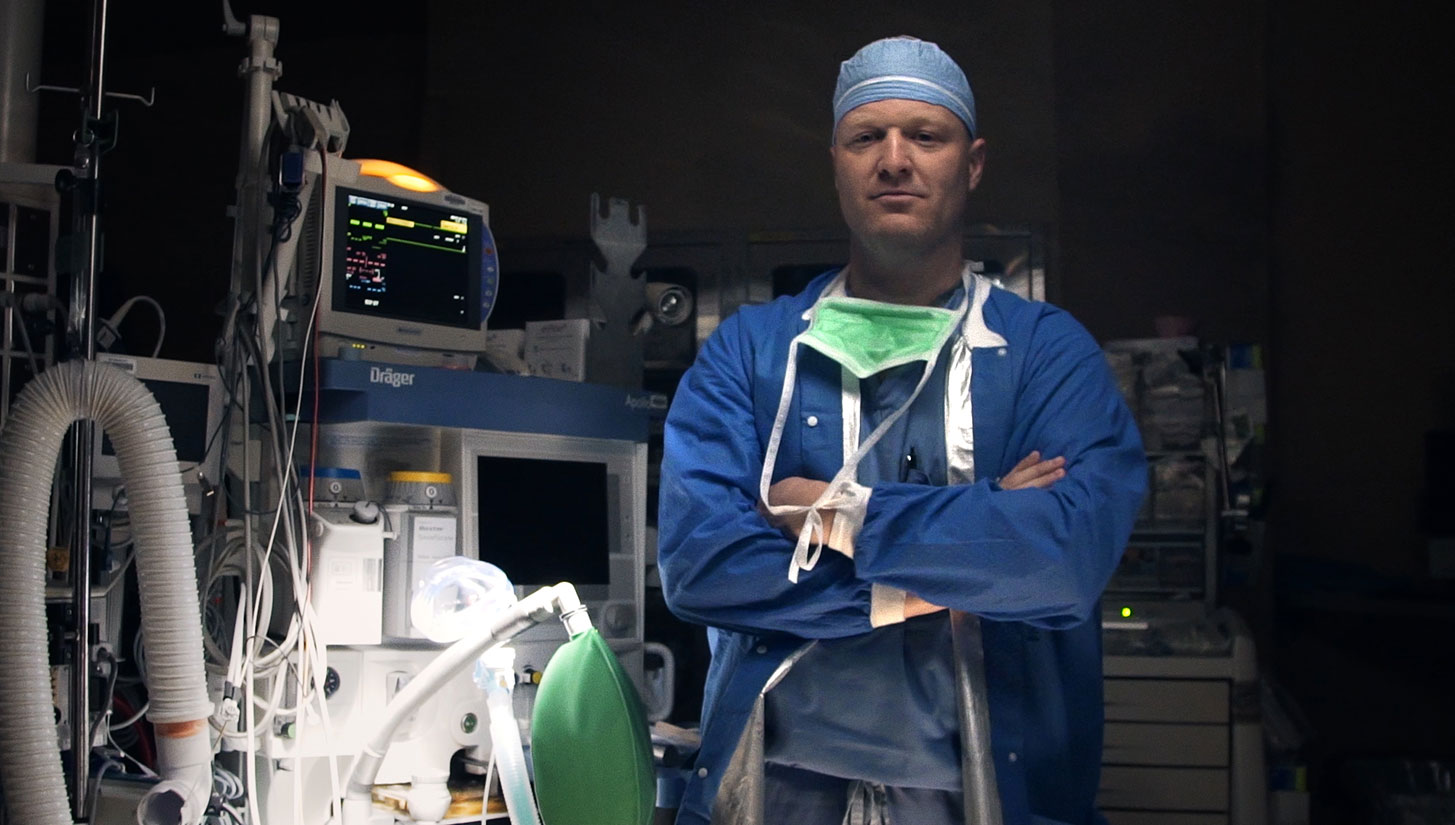
Foosballers also goes to great lengths to explain the history of foosball, which is much appreciated by this uninformed viewer. The history, from the first patents for table soccer to the Godfather of Professional Foosball Lee Peppard’s plan to put the sport on the map and beyond, fits seamlessly into the story thanks to various characters’ connections to big moments in foosball history.
We had the opportunity to link up with the man who expertly weaved this narrative together, director Joe Heslinga.
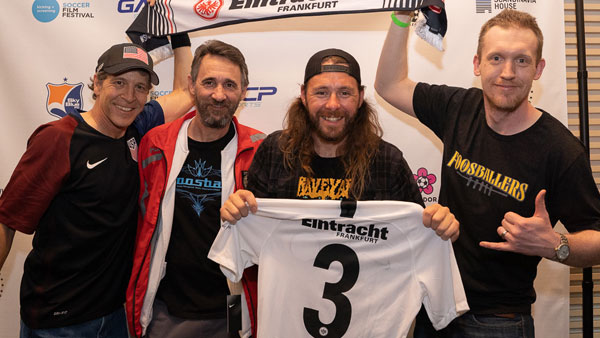
Urban Pitch: Foosballers is your first feature film. Why make a movie about foosball?
Joe Heslinga: I’ve always wanted to make movies. I moved out to LA about 10 years ago, and I was working at production companies for the first few years before I got my first writing job for TV. But I always had this deep passion to make films. One day, me and my producing partner Mike Wagstaffe were talking about obscure sports. Talking about different world championships that either are or aren’t on TV.
They have a world championship for yo-yos, they have a world championship for horseshoes, they have a world championship for corn hole. And we were just joking around and said, “I bet you they even have professional foosball.” And we Googled it, and we were blown away at all the results that we found. And blown away that there wasn’t any definitive thing that had been done about foosball. No movies, no TV shows.
The biggest thing they did was a couple news segments on ESPN back in the ‘90s. And then, there’s a World Table Soccer Almanac that we found on Amazon that was 750 pages long. It looked to be self-published by two authors who we later found out were big foosball players in the ‘70s, and they’re in the movie. But the fact that they had a 750-page almanac blew our minds. Like what the hell is this, you know?
And then we found out that they had a World Championship dating back all the way to the ‘70s. It started out as one of those internet rabbit holes that we just went down, and it manifested itself into an hour-and-a-half long documentary. It’s the result of all those hours that we spent in the middle of the night just Googling stuff and saying, “Holy shit, I can’t believe that this is a real thing.” And we started to meet all the foosball players a couple years ago. We knew absolutely nobody in the foosball world.
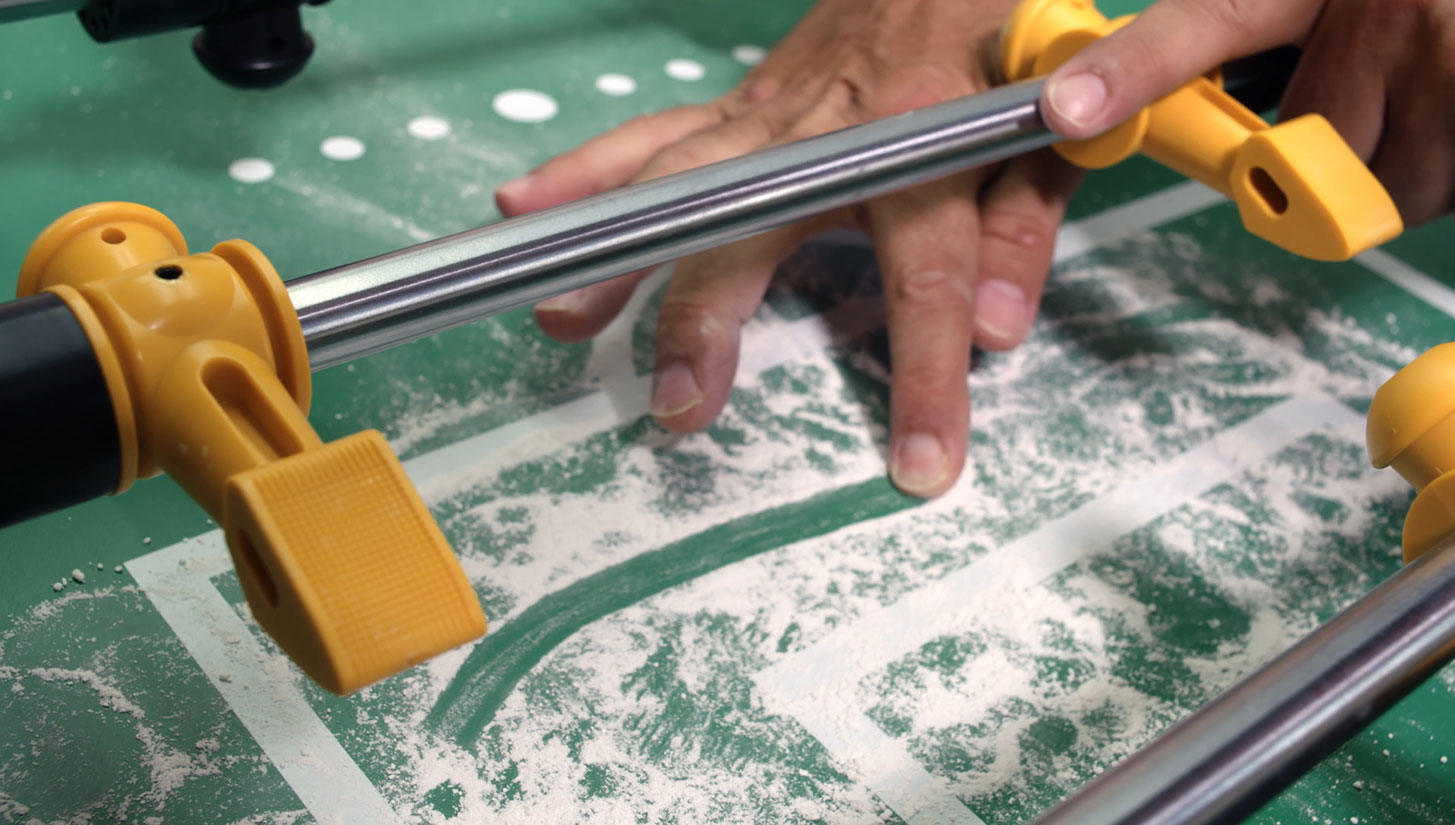
I enjoyed going down the rabbit hole with you, I felt like I was right there. And I love the idea of it because foosball is something that might not be on the top of people’s minds today, but most people know about.
It’s funny that pro foosball, nobody knows about. But foosball itself, everybody knows. And everybody has a weird story associated with it. I remember when I went to college and came back home, my brother, who was in high school at the time, had got a foosball table. We’d play when I would come back home from college.
And it’s one of those things where if it’s at a bar, it’s one of the first things people notice. And their eyes kind of light up, it has this weird magnetism to it. But there’s this whole world that nobody knows, and that’s professional foosball. So again, why we were drawn to it is it’s something that everybody knows, but nobody knows at the same time.
How did you choose which players to shadow?
A couple things went behind our casting. One was I’ve watched a lot of competition documentaries where they follow anywhere from two to seven people preparing for a world championship, only to get there and be disappointed that all the people that I just got emotionally invested with aren’t even in the top 10. They peter out at like, 25th place or 50th place, and I always just get disappointed at the end of it.
Why did I just invest the past hour-and-a-half into someone who’s not even good? They might have had an interesting story but they weren’t the top. Having interesting characters is obviously very important, especially in a documentary, but it was important to me to find the best players and see the differences between them. And once we narrowed it down to the top people who we figured would be at least in the top 10 in the rankings or maybe within the top 20, we looked at their different personalities and backgrounds.
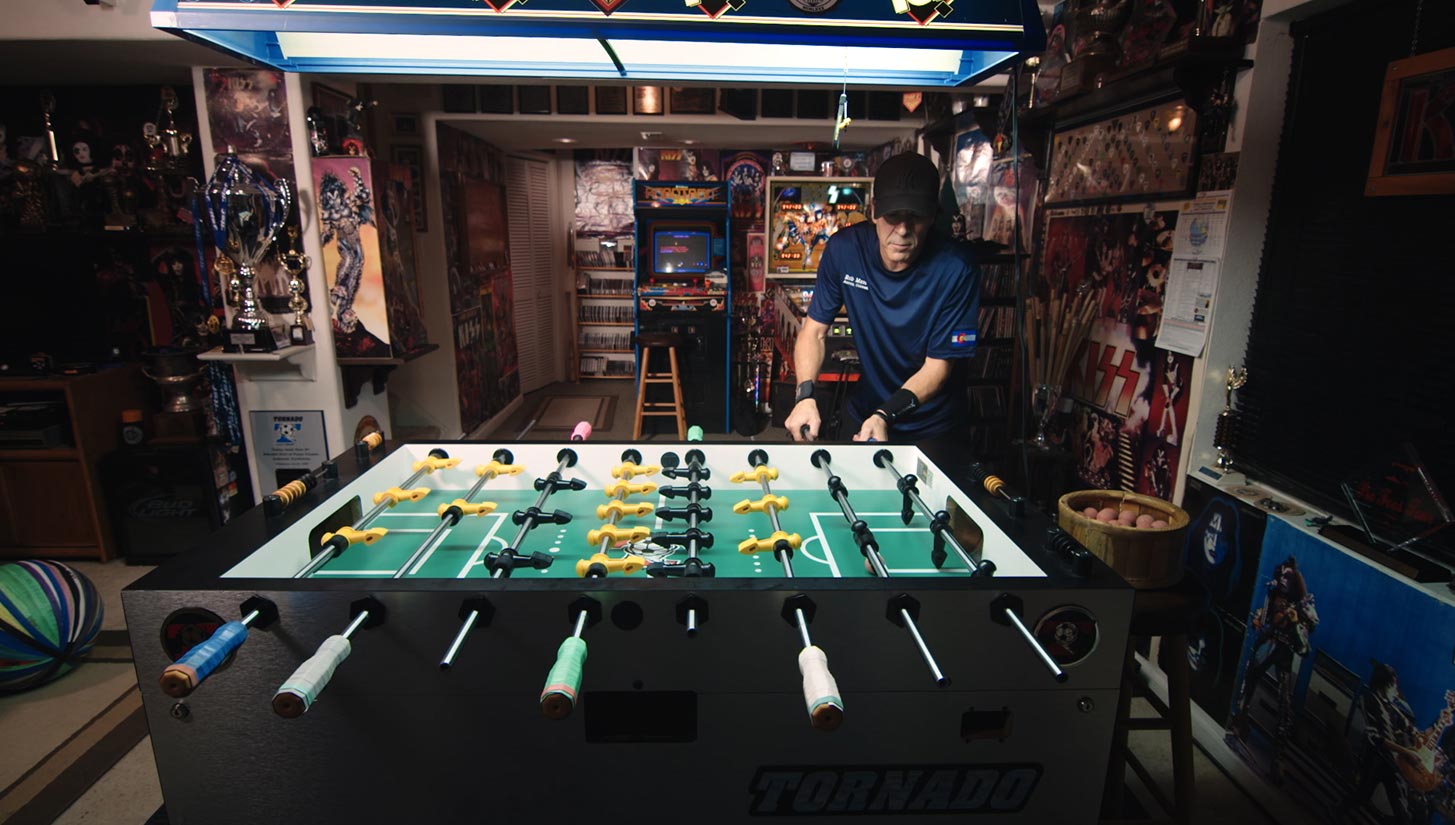
We found a player from the ’70s who still plays today, and thought he would be a great lens to go back in time to explore the history of the ‘70s through his personal experiences. And then we found another guy who was a big player in the ‘90s who also still plays. So we were able to not just find an interesting, eclectic cast of people to be in the movie, but also we were able to use them as vessels to travel back in time to see what foosball was like in the ’70s, ‘80s, ‘90s, and today.
And then with Cindy Head, we wanted to have a woman in the movie. Even though we were focusing on open singles, which is typically male dominated, there were so many great women who play foosball that we wanted to have someone represent them. And with Cindy, she’s a 40-time World Champion, and we knew that she was a good foosball player, and she’s always loud and boisterous on the table. We had no idea of her story before we met her, but we figured this is a great person to follow. Her life was saved by foosball. Which sounds ridiculous to most people, but when you actually see it in the movie it’s pretty powerful.
Did you ever try to play any of them during your down-time while shooting?
Totally. Like I said, I knew nothing about pro foosball. I am probably like most people in the world, where I can play very poorly recreationally and get by and have fun. When we started making the movie, I was like “Okay this is my chance, I’m going to get some inside scoop on how to play.” They would teach me stuff, but I’m only marginally better than I was when I first started.
But to really be good at foosball, you have to practice eight hours a day, seven days a week. You have to play all the time because the muscle memory is so specific. And with just a little movement, the ball can go 10 degrees the other way. It may seem like anybody can go play foosball and win a World Championship because it doesn’t seem that complicated. But when you’re sitting on the opposite end of a table with a 10-time World Champion and you see what they do, and then when they shoot the ball and you can feel it vibrating in your chest because he hit it so hard, it’s really intimidating.
Everybody I’ve met has said “Oh, I can probably beat a World Champion.” And arrogantly I said “Well, how good could they really be?” And then you watch them and you’re just like “Dude no, this is epically next-level shit.”
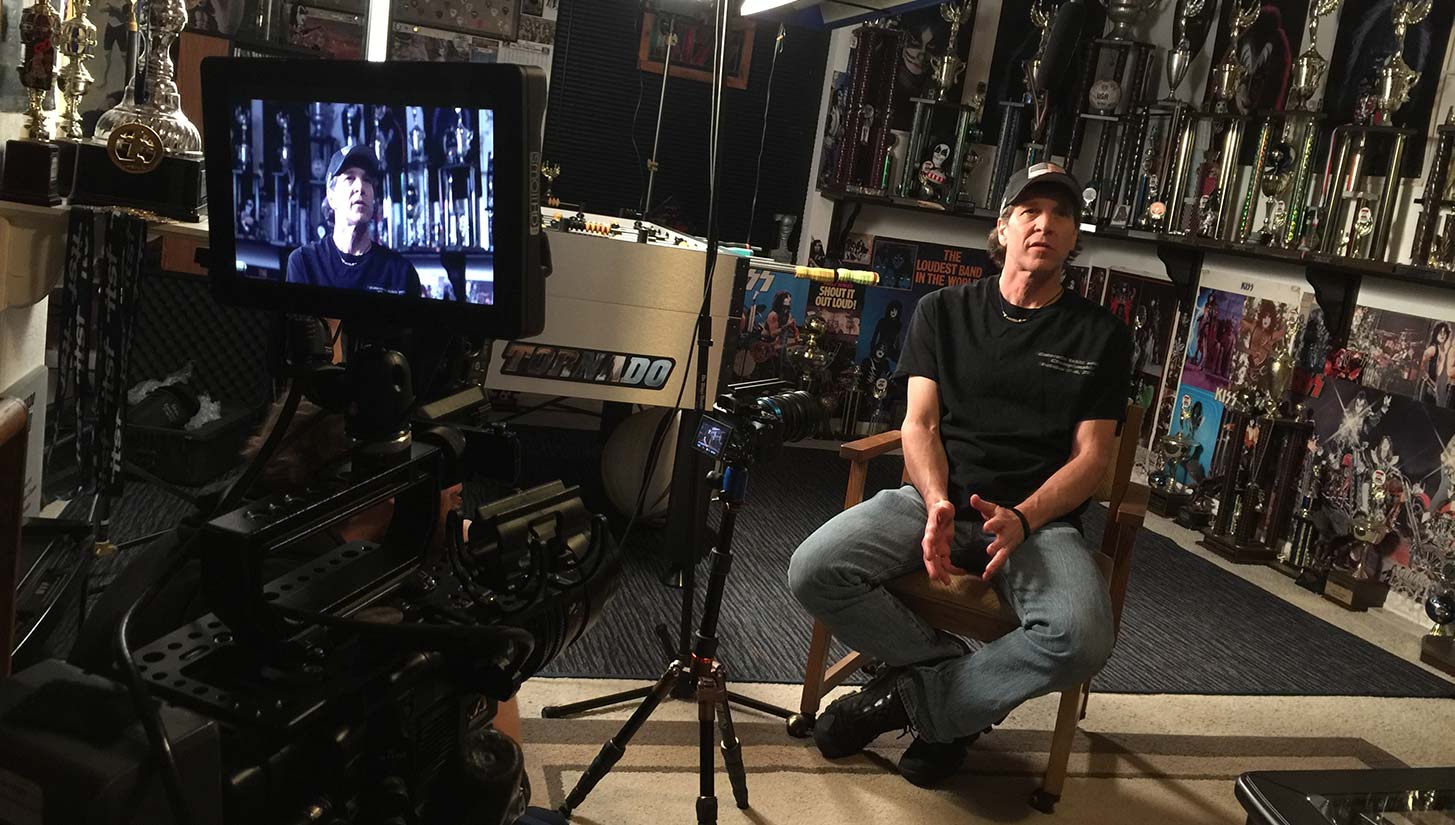
Now given that it was your first feature film, were there any challenges that popped up which you didn’t anticipate?
Yeah, a thousand of them. There were roadblocks along the way at every point. Raising money was a challenge. Nobody was giving me money to make a movie because I had never made a movie before. The only way we were able to raise money at first was Kickstarter.
But post-production was probably the biggest challenge we had because we didn’t have budget for an editor. We didn’t have a budget for a lot of the stuff that normally goes into post-production.
And as you probably can imagine, every documentary has an editor that pieces it together in post. And I had never edited a movie together, ever. The first thing I really cut together was the sizzle real that we did for Kickstarter.
I had to learn on the fly over a period of time how to edit a movie. And I was doing it a lot of times in the middle of the night after I had come home from work. I had a daughter born right during the middle of this as well. I had a lot of stuff that I was doing both personally and professionally.
I went through probably a thousand different versions of the movie before we landed on this one. It was just a lot of trial and error, seeing what works, what doesn’t work. Just restructuring the movie, playing around with tone and music and everything. But post-production took a long time. It was mostly just me editing the movie in my dining room, and our producers would come over every so often and check in and see what I had been up to. I did it all in my apartment. I took over the dining room for two years — we didn’t have a table to eat on.
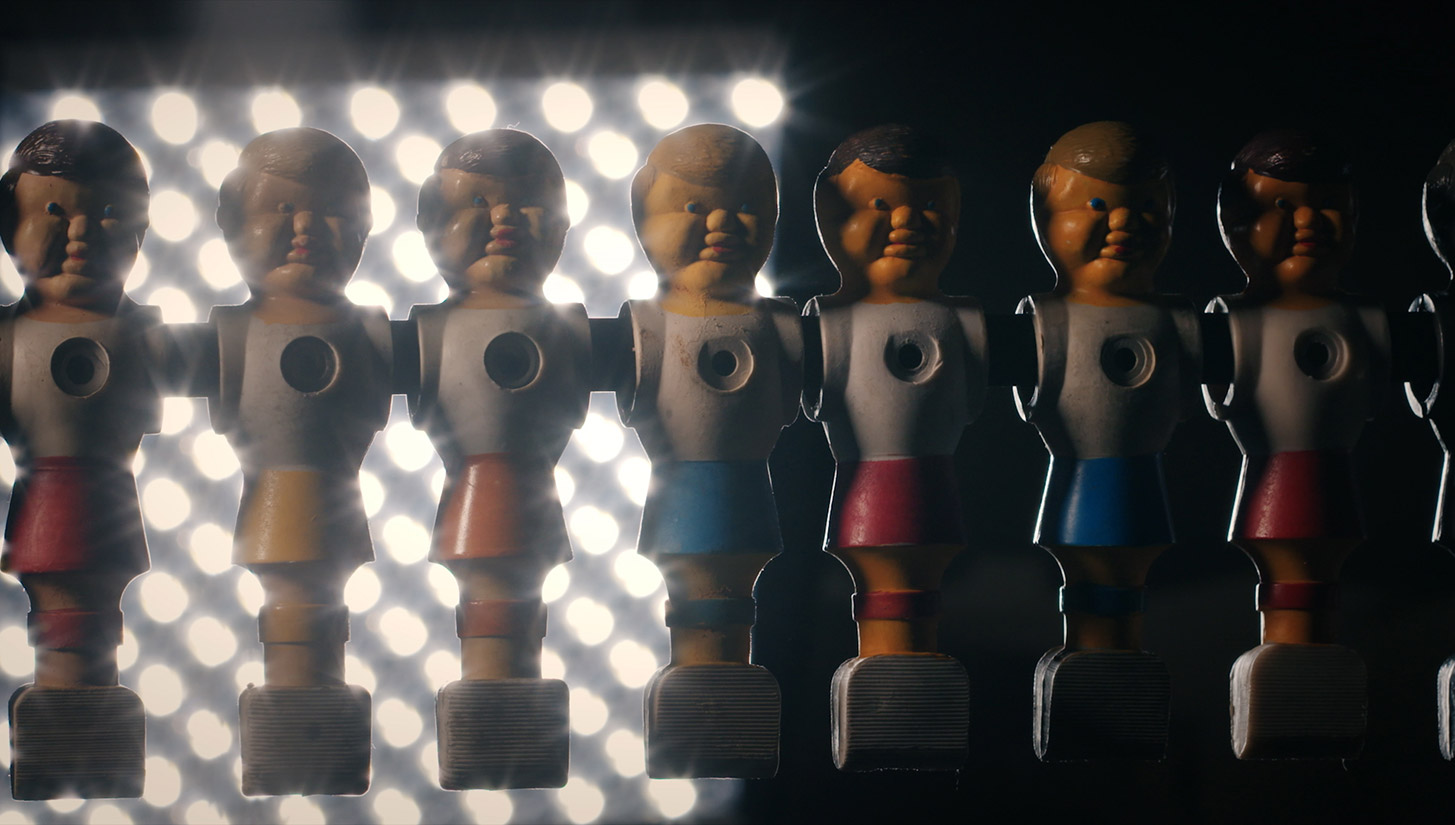
What was your favorite part of the film? Either something that turned out beautiful in post-production or maybe something you enjoyed doing while filming?
During production it was a blast because we were living like foosball players, going to a new city every few days. We would either crash on someone’s couch or get a hotel and then we were on to the next one.
We got to hang out with Tony Spredeman and his family in Florida and drink beers with them, which was really fun. When we went to Louisiana, we got to hang with Terry Rue and his family and they cooked us great Cajun food and welcomed us like we were part of their family. Every trip that we made was different and unique and fun for its own reason.
But, as far as favorite moments in the movie, it’s so hard to say because so much of it is great. I would say that the emotional parts are some of my favorite. As funny as some of the movie is, watching someone tear up talking about foosball is really meaningful to me because it’s something that’s silly to most people. Pro foosball is something that’s seen as a joke, but when you see how much it means to people and the passion that they have, it’s what attracted me to really dive in and make the movie.
It’s like anybody who follows their dream, who follows their passions. They do it not for money or fame or fortune, they’re doing it because they love it.
There was something that as a filmmaker connected me to them because when I made the movie, I did it in my dining room in the middle of the night. Nobody knew I was doing it, just like when they’re practicing in their basement in the middle of the night.
Not for anybody else, but just for that satisfaction of completing their goal to be the best foosball player. I was trying to make the best movie possible and everyone for the past couple years has been like “Hey man, where’s the movie? Are you still working on it?” And I’m like “Yeah, it takes time. It takes time and effort, and we’re doing the best we can.”
To find out more on Foosballers and for screening dates/locations, visit the film’s official website, and follow it on Instagram and Twitter.
Interview edited for clarity and brevity.
Photos courtesy of Foosballers/Pull Shot Productions.













